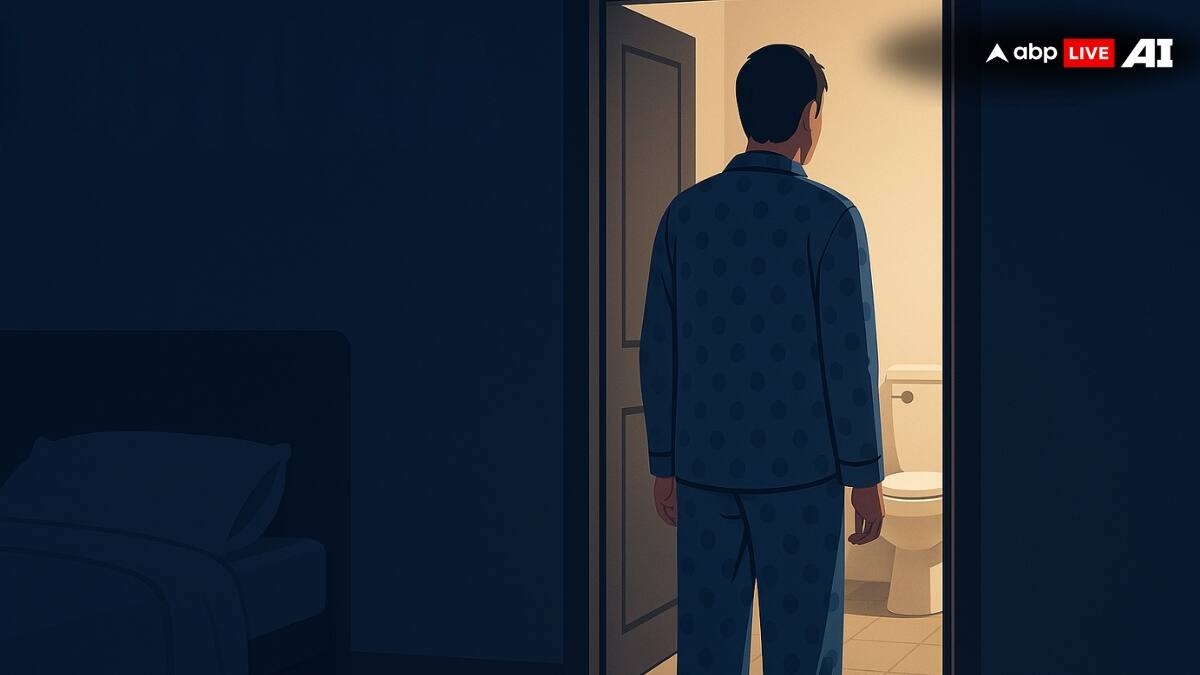
Frequent Urination At Night: Waking up to use the bathroom once in a while might seem normal, but when it becomes a nightly routine, it can take a toll on your sleep and overall well-being. Frequent urination at night, or nocturia, is more than just an inconvenience — it can be a sign of underlying health issues ranging from hormonal changes to chronic conditions like diabetes or sleep apnoea. Nocturia impacts up to one in three adults over the age of 30.
While it tends to be more prevalent in women under 50, the pattern shifts with age, becoming more common in men after the age of 50. In fact, over half of adults past 50 experience nocturia to some degree. Managing nocturia ideally involves addressing its underlying cause whenever possible.

However, a review published by the National Library of Medicine (NCBI) says, there remains a clear need for newer, safer, and more effective treatment options. Dr. Jamin Brahmbhatt, an Indian-origin urologist and robotic surgeon with Orlando Health in the US, has shared his insights in an article on CNN, explaining why it happens and how to manage it.
Citing his own case, he writes that frequent trips to the washroom at night could be blamed on hydration habits, besides "hormonal shifts, medications or even an undiagnosed sleep disorder". Common Causes Of Night-Time Urination 1. Late-Night Eating and Drinking Habits Your bladder may not be the real problem — your evening diet could be to blame.
Caffeinated drinks, alcohol, and even herbal teas can act as diuretics, increasing urine production. Foods with high water content, like watermelon, oranges, and cucumbers, can also contribute. A bowl of fruit or soup before bed may seem harmless but could be keeping you up at night.
What to do: Limit fluids two hours before bedtime and avoid water-heavy foods late in the evening. 2. Hormonal Changes and Aging As we age, the body produces less antidiuretic hormone (ADH), which helps the kidneys retain water.
Lower ADH levels lead to increased urine production at night. For women, menopause-related oestrogen decline can weaken bladder control. In men, prostate enlargement (benign prostatic hyperplasia or BPH) can obstruct urine flow, making frequent urination more likely.
What to do: Speak to a doctor about hormone-related changes and possible treatments if symptoms persist. 3. Underlying Health Conditions Nocturia can be an early sign of health issues such as: Diabetes: High blood sugar levels lead to increased urine output.
High Blood Pressure: Fluctuating blood pressure at night affects kidney function, increasing urine production. Sleep Apnoea: Undiagnosed obstructive sleep apnoea (OSA) can trigger frequent awakenings and increased urine output. What to do: If you also experience excessive thirst, snoring, or daytime fatigue, consult a doctor to rule out these conditions.
4. Medications That Increase Urination Certain medications, especially diuretics (prescribed for high blood pressure and heart conditions), increase urine production. Other drugs, including antidepressants, muscle relaxants, and diabetes medications, can also contribute.
What to do: Talk to your doctor about adjusting medication timing to reduce night-time urination. 5. Changing Sleep Patterns with Age As people age, they spend less time in deep sleep.
This means minor disturbances — like a partially full bladder — are more likely to wake them up. What to do: Improve sleep hygiene by keeping a consistent bedtime, reducing screen time before sleep, and maintaining a cool, dark bedroom environment. When to Seek Medical Help? While occasional night-time urination is normal, frequent disruptions should not be ignored, especially if: You wake up more than twice a night to urinate.
You have other symptoms like excessive thirst, snoring, or fatigue. You notice changes in urine colour, urgency, or pain. A doctor can help identify and treat any underlying conditions contributing to nocturia.
Practical Steps to Reduce Night-Time Urination Monitor fluid intake: Reduce fluids before bedtime, especially caffeinated and alcoholic drinks. Bladder training: Try delaying urination gradually to train your bladder to hold more liquid. Check your medications: Adjust timing with your doctor’s advice.
Address sleep disorders: If sleep apnoea is suspected, seek evaluation. Manage underlying conditions: Keep diabetes, blood pressure, and hormone levels in check. Frequent night-time urination is more than just an inconvenience — it can affect sleep quality and overall health.
"So next time you shuffle to the bathroom at night, don’t accept it as normal. Listen to your body. It might be sending you an important message," writes Dr Jamin Brahmbhatt.
[Disclaimer: The information provided in the article, including treatment suggestions shared by doctors, is intended for general informational purposes only. It is not a substitute for professional medical advice, diagnosis, or treatment. Always seek the advice of your physician or other qualified healthcare provider with any questions you may have regarding a medical condition.
] Check out below Health Tools- Calculate Your Body Mass Index ( BMI ) Calculate The Age Through Age Calculator Also read Brain Food? There Are Nutrient Deficiencies In Vegan Diets That You Need to Watch Mounjaro Enters India: The Weight Loss & Diabetes Drug May Have These Side Effects; Know Price.















